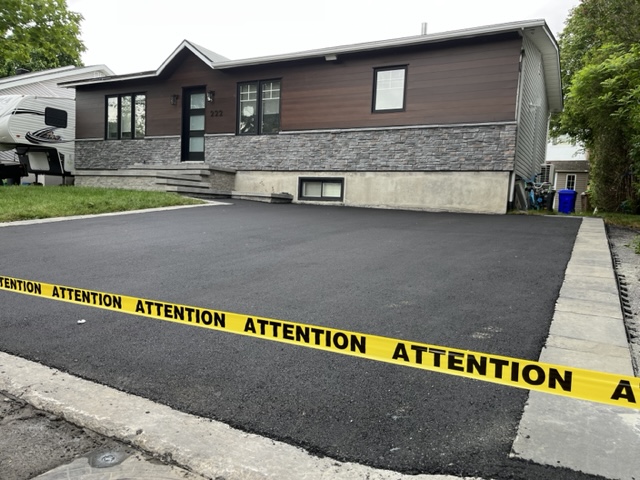
February 5, 2025
The type of asphalt and the size of crushed stones used differ for paving a residential driveway and a commercial parking lot with daily heavy traffic. The thickness of the asphalt also varies. However, both surfaces must be excavated by professionals to build a solid base of crushed stones, which is compacted and leveled before asphalt paving.
The sturdier the soil (non-clay), the thinner the layer of crushed stone required. A geotextile membrane must be placed beneath the crushed stones to separate them from the soil, preventing debris and soil particles from mixing with the stones and compromising the base's stability. Additionally, to achieve optimal stability, the base's width should exceed the surface to be paved by 12 inches on each side.
Excavation Depth for Asphalt Paving
For a driveway, it is recommended to excavate to a depth of 12 to 18 inches if the soil is sandy (and drains water well) and 18 inches or more if the soil is clayey and poorly drains rainwater.
A slight slope should be created during excavation to direct rainwater toward the street and storm drain. This slope should be at least 2%, equivalent to ¼ inch per foot. Proper water drainage prevents infiltration and the formation of cracks.
The aggregate mix used for paving a driveway should be class MG-20 (crushed stones with a maximum size of ¾ inch). Proper compaction of these stones with efficient machinery is essential for the asphalt surface's strength. If the base's thickness exceeds 12 inches, the crushed stones must be compacted in two layers.
Surface Asphalt Layer
The surface asphalt mix (bituminous mixture) should consist of 94% aggregates and 6% bitumen. This class of asphalt is called EB-10 (bituminous mixtures containing aggregates up to 10 mm in size). The asphalt layer should be 2.5 to 3 inches thick to reach a minimum thickness of 2 inches after compaction. Block supports or a concrete border are recommended to prevent the asphalt from cracking or deteriorating prematurely.
Regulations for Asphalt in Commercial, Industrial, or Institutional Areas
For large commercial, industrial, or institutional parking lots, each municipality has specific standards governing the minimum or maximum number of parking spaces, their dimensions, and more. For the paving itself, larger aggregates with a less smooth and less dark finish are used to enhance resistance to degradation and heat. For the base layer, ESG-14 grade bitumen (with a bitumen content between 4.2% and 4.8%) is recommended, with a thickness of 60 mm. For the surface layer, an ESG-10 class mix (10 mm) with a bitumen content of 5.2% to 5.7% should be used. The slope percentage for each section of the parking lot and driveways is determined by the municipality.
Contact the RZR ASPHALTE team for more information or to request a quote. We would be happy to assist you